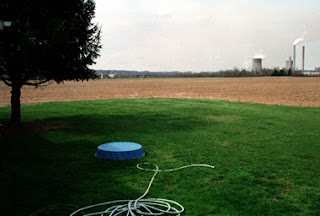School site's suitability questioned
Mason land may be
contaminatedApril 2, 1998
By Tara Tuckwiller
Gazette Online
POINT PLEASANT - Mason County school officials say they've found the right piece of land for their consolidated high school. It's vacant and flat, just north of Point Pleasant, with plenty of room for parking lots and football fields.
It also sits in the shadow of a federal Superfund site, where toxic waste left over from a World War II explosives factory lies buried in the ground and still contaminates the groundwater.
Also, environmental officials say pesticide residues such as DDT, the legacy of an old state agriculture test station, may still contaminate the 65-acre tract the school board wants.
"I'm alarmed," said Shirley Gue, a parent who has led residents in a three-year fight against the consolidated high school. "If they're going to build this school, it at least needs to be in a safe place."
Lawsuits filed by Gue and other parents have stalled the project since 1995, when the state School Building Authority gave Mason County $14.4 million to consolidate its three high schools. County officials had previously talked about building on a tract of land the county already owns, until this week when they got permission from the authority to buy the land near the Mason County Airport and build the school there.
"We approved this on the condition that it's a suitable site," said Clacy Williams, the authority's executive director. "I wasn't aware of any problem with pesticides. That sounds like something the school board is going to have to get their architectural firm to address."
The school board would pay the 10 local businessmen who own the property as much as $650,000 for it, county Superintendent Larry Parsons said. The original site near the Mason County Vocational Center is too small, he said, and the owners have government documentation that says the site near the airport is safe for building.
"We'll do the necessary studies," Parsons said. "If it ends up that it's not safe, I'll be the first to say build somewhere else."
The buried chemicals at the nearby Superfund site probably won't threaten the school site, said Pete Costello, site project officer for the state Division of Environmental Protection's Superfund section. The school site lies outside the area the factory used for production and waste treatment of the explosive trinitrotolulene (TNT), where contamination was heaviest. Past tests of the land the school board wants have not shown any contamination.
"We don't have a decision document to write it off," Costello said. "We're comfortable there's nothing there, but we're not certain."
When the explosives plant shut down in the 1940s, the state started using part of the land - the school site - as an agricultural test station. Since that had nothing to do with the TNT plant, the Army didn't have to clean it up, Costello said.
"Pesticide residue would be a big concern with me," he said. "In the 1950s, DDT was very common, and some other chemicals that are pretty persistent. Being an experimental station, it's hard to tell what they were testing."
In later years, somebody used the same site to dump some PCB transformers illegally, Costello said. The contaminated soil was scooped up and hauled away.
"There were some groundwater and soil samples taken in 1988 or 1989 regarding that, and everything appeared hunky-dory," he said.
Parsons said residents who oppose consolidation are just grasping at the contamination issue in a desperate attempt to stop the project. Gue, who has filed for a circuit court injunction against the consolidated school, said she will pursue the contamination angle if that tactic fails.
School officials are letting politics get in the way of children's safety, she said.
"Look who owns that property," she said. "You're talking about the power brokers of the county."
A partnership called Deerfield Development bought 700 acres in and around the Superfund site in 1995, just after Mason County got the $14.4 million from the School Building Authority. The partnership consists of state lottery director John Musgrave, who headed the Mason County Development Authority in 1995; Jack Fruth, who owns a chain of pharmacies; Bob Wingett, publisher of the Point Pleasant Register; Michael Sellards, executive director of Pleasant Valley Hospital; area businessmen Marshall Reynolds, Art Hartley Sr., Leo Calandros and Charles Lanham; and Point Pleasant attorneys C. Dallas Kayser and Michael Shaw.
Shaw said he and his partners bought the land because they wanted to bring in industries, and they never thought of selling it to the school board. A number of businesses have shown interest, he said.
"We're not too keen on the idea of putting a school there," he said. "It would severely limit our ability to develop businesses."
Costello said the land Deerfield Development owns would probably not be the easiest land to sell, since so much of the adjacent land has been on the EPA's national priorities list for hazardous waste cleanup since 1984.
"There's a stigma being on this national priorities list," he said. "The school portion isn't on there, but it's so close to the land that is."

No comments:
Post a Comment
Please be kind in your comments and reframe from any personal attacks. Thanks!